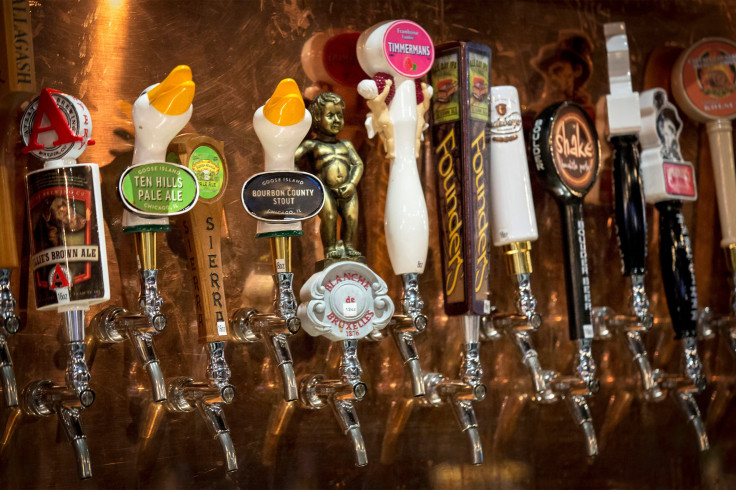Can Drinking Ruin Your Career? No, But It Can Drain Your Bank Account

Cheers! But preferably during happy hour when there are drink specials, and at that cheaper, not-too-swanky bar, or even at home with some Franzia and PBR. That’s because while drinking may not be hurting Americans’ professional and personal lives, it’s putting a dent in millennials’ wallets.
Drinking, of course, isn’t harmless physically, given the possible long-term damage to your liver as a result of heavy consumption. Bank accounts take a hit, too. The bar and nightclub industry pulled in $24 billion in revenue last year, and respondents to a survey conducted in 2014 by the online organizer Eventbrite spent an average of $26 on libations during a single night out, with only 6 percent saying they bought no drinks. Head out once a week or more, and those costs can start to snowball.
Read: Alcohol Can Lead To Binge-Eating, Scientists Find
That’s exactly what the majority of young millennials are doing, according to a recent study from the personal finance site Bankrate.com.
Among those between the ages of 21 and 26, 51 percent said they routinely went to a bar once a week at the very least, compared to 41 percent among millennials as a whole, or those ages 18 to 36, according to the study, which relied on a survey of about 1,000 American adults and yielded a 3.7-percentage-point margin of error. Less than a quarter of their Generation X counterparts did the same, as did fewer than a fifth of Baby Boomers and about a tenth of the Silent Generation, the survey found.
While the Bankrate study didn’t compare millennials’ habits to those of their older counterparts when all groups were in their twenties — and age when it’s generally more common to enjoy a weekly night or two out — it’s been well-documented that demand from America’s largest generation has been a boon for the U.S. wine industry. The same can be said for whiskey and craft beers.
But millennials may not differ completely from previous generations, said Bankrate’s chief financial analyst, Greg McBride.
“I’m not sure today’s 25-year-olds are any different from 25-year-olds 20 years ago,” he said, adding that the problem, regardless of generation, was a matter of keeping celebrations from turning into habits. “The key thing here is… striking a balance of rewarding yourself versus rewarding yourself so much that the novelty wears off.”
Still, he added, there is one financial habit that sets millennials apart from their predecessors, even when comparing them to members of previous generations at the same age: They’re better savers.
“Generation X has a lot of similarities [with millennials] with indulgences,” he said. “The difference is, with Gen Xers, it was coming at the expense of saving. With millennials, it’s not coming at the expense of saving.”
Personal finances aside, is frequent drinking setting millennials back in their personal or professional lives? It's not likely, according to recent research.
A study published this week in the National Bureau of Economic Research examined the mental health, physical fitness and conduct of U.S. Army soldiers between the ages of 20-and-a-half and 21-and-a-half years old, based on results from a variety of tests and examinations conducted between 2009 and 2015. The researchers looked for changes before and after the 21st-birthday threshold, when the percent of those who drank alcohol rose from 13 percent to 70 percent. They found no statistically significant change in the soldiers' depression or thoughts of suicide, physical fitness, readiness for deployment or job performance as the enlistees embraced their legal right to indulge.
Read: New York Governor Andrew Cuomo Opposes Marijuana Legalization On Safety Grounds, Promotes Alcohol
The results, however, might be different if a group of “regular” people were observed, as opposed to members of the armed forces.
“They live in a very restricted environment, they have jobs — they’re not equivalent to the general population,” conceded Marigee Bacolod, an associate professor of economics at the Naval Postgraduate School and one of the study’s authors. “It could be suggested that soldiers are drinking responsively.”
However, the somewhat narrow study population, in which external factors affecting drinking habits were largely controlled for, allowed the researchers to establish a causal relationship between drinking and changes in behavior and ability, while previous studies have often stopped at correlation.
Other research, she noted, left open the possibility of “reverse causation” — namely, that a person might drink more because of a job loss or poor job performance, and not vice versa. Bacolod and her co-authors could more accurately measure the impact of drinking, or lack thereof, in such a controlled environment.
“You can’t attribute it to broader factors,” she said.
In that case, bottoms up.
© Copyright IBTimes 2024. All rights reserved.






















